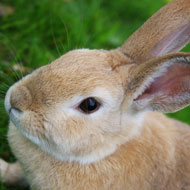Bacteria transmission 'easier than previously thought'

Findings suggest that ST121 is likely to have jumped from humans to rabbits around 40 years ago.
New research suggests it may be far easier than previously thought for bacteria to jump from one host species to another.
Scientists from the universities of Glasgow and Edinburgh discovered that a single genetic mutation in a strain of bacteria allowed it to jump species and become infectious to rabbits as well as humans.
The team say their findings have "major implications" for the way we assess the risk of bacterial infections that can pass between animals and humans.
While it is well known that it takes relatively few mutations for viruses to be transmitted from one species to another, it was previously thought that this process was far more complicated for bacteria.
Jose Penades from the University of Glasgow, who co-led the study, said: "The ability for pathogens to switch host-species and lead to an epidemic in a new host population is of major concern to veterinary and public health professionals.
"Our results represent a paradigm shift in understanding of the minimal adaptions required for a bacterium to overcome species barriers and establish in new host populations."
Scientists studied the genetic make-up of Staphylococcus aureus ST121, which has caused widespread epidemics on rabbit farms globally.
ST121 is usually harmless but can cause serious skin infections in rabbits and a range of conditions in humans, including minor skin infections, meningitis and sepsis. It is found on the skin and in the respiratory tract of some people.
Findings published in Nature Genetics, suggest that ST121 is likely to have jumped from humans to rabbits around 40 years ago. A single genetic mutation in the bacterial DNA code was found to have been responsible.
Ross Fitzgerald from the University of Edinburgh's Roslin Institute, who co-led the study, said: "This latest research has important public and veterinary health implications which will require a re-examination of the future threat posed by bacterial host switching events."



 The veterinary mental health charity Vetlife is inviting the veterinary community to join it for a sponsored cold-water dip.
The veterinary mental health charity Vetlife is inviting the veterinary community to join it for a sponsored cold-water dip.